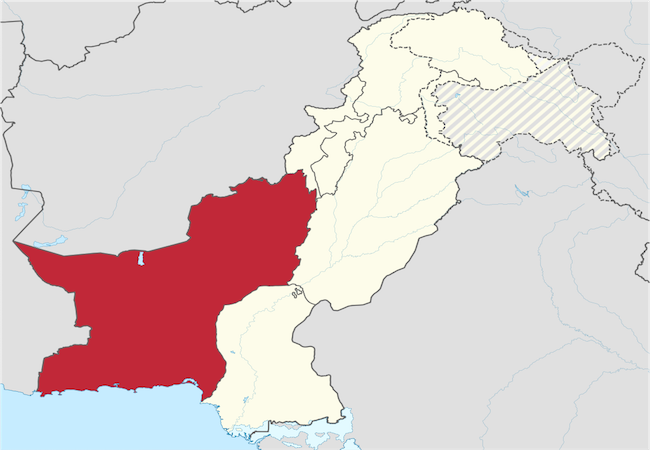
By Zainab Aziz
Insurgents in Balochistan blame the Pakistani state for denying it’s people rights and extricating its assets to fuel development in different parts of the country. Balochistan is the least populated province while it is the largest province by landmass. It has sizable Pushtun population along with the majority ethnic Baloch people. Even with the abundance of natural resources, Balochistan remains the least developed province of the country. Militant groups and separatist movements carried out by insurgents demand independence while most of the Baloch groups urge for the greater share in the development projects and resources. Ever since Pakistan has gained independence from the British colonial rule in 1947, the province of Balochistan has seen many uprisings. The conditions became more severe in the episode of insurgency that began in 2006 when a prominent Baloch leader, Nawab Akbar Khan Bugti, was killed in a clash with Pakistani forces.
Additionally, Balochistan has the social structure based on the tribal and feudal system which revolves around the institution of tribal chief (Sardar). The government must play a positive and constructive role in improving the Balochistan socially, politically and economically. For this, it must discourage the institutions like Sardars, Nawabs etc. It is an evident fact that this cannot be done in a glimpse and it will take many years to do so. Moreover, the economic constraints of the people in Balochistan does not let them to be dauntless enough to struggle against an established institution, which has existed for centuries.
There is no opposition to the view that interference of federal government in provincial affairs of Balochistan in mega projects like Reko Diq and operating Gawadar Port, resources utilization and royalty, extreme impoverishment, arbitrary attitude of the security forces and abysmal situation of missing persons, deplorable educational and health infrastructure, cultural sensitivities, absence of genuine representation and lack of coordinated efforts to streamline the resentful Baloch youth are real problems of the land. However, the people of Balochistan are fully aware that terrorism and insurgency is not the solution to address these complicated problems. Therefore, appeal of raising arms against the state is losing its strength by each passing day as Balochistan braces towards new era of peace and development.
“We were trapped by our leaders who said they are fighting for the rights of Balochs, but later we realized that they were enjoying their lavish lives abroad and had pushed us and our families to a war here,” Obaidullah alias Babrak, a surrendered Lashkar-e-Balochistan commander, told reporters once.
Furthermore, Balochistan has an exceptional geostrategic location as it is a gateway Central Asia, Middle east and South Asia. Due to this reason, some of the Baloch people think that, Balochistan only serves as a strategic asset in the policy of Pakistani establishment. For regaining the Baloch people’s interest in the legitimate successive governments, the civilian and military leadership must formulate a comprehensive political strategy that can address their socio-economic grievances. The government needs to bring an end to old system of patronage politics of supporting some selected sardars and their tribes. For the societal betterment of Balochistan, the tribal chiefs are also the ones who create hurdles.
Balochistan plays a crucial rule in the Pakistan’s economic development and acts as the potential lifeline to increase Pakistan’s pivotal role in international politics and economics, due to its geo-strategic location and the plentiful natural resources in the province. The US/ NATO endgame in Afghanistan will take its toll in the most vulnerable provinces of southern Afghanistan – Helmand and Kandahar – that border Balochistan. The Pushtun-dominated regions of northern Balochistan which border the turbulent provinces, will have a consequential outcomes of major spillover of instability into their areas. This can further complicate the situation. The most viable long-term strategy to stop the prolonged conflict in Balochistan is to deliver an efficient educational and governance system which can release the Baloch from the clutches of corrupt Patrons (tribal sardars). However, this all requires the veracious and righteous will and determination of our “men in power”. Hence provide people a fair and eligible share of jobs then to exploit the natural resources available in Balochistan to fullest.
Balochistan is awaiting development and prosperity which the ongoing mega project ‘CPEC’ is bound to ensure in near future. Development work on Sea Port, Airport and industrial Zone in Gwadar is in full swing. Chinese investment of $46 billion under CPEC plan surely will usher in a new era of economic activity and prosperity giving boost to local economy. However, this region which was once the most volatile area because of the Baloch insurgents’ subversive activities, who constantly attacked security personnel and civilians as well as important installations has now the improved security conditions.
For the moment, if the prevalent conditions persist, the world will just have to wait and see whether Balochistan can weather the storm. This time, thanks to CPEC, the choices for economic progress in the region are plentiful – but the results will depend on what policy Pakistan has in the near future. For the people of Balochistan, hope springs eternal.
Zainab Aziz is a Research Affiliate at the Strategic Vision Institute in Islamabad, Pakistan




